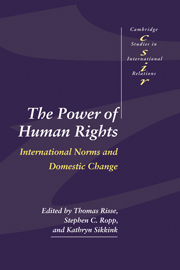Book contents
- Frontmatter
- Contents
- List of contributors
- Preface
- 1 The socialization of international human rights norms into domestic practices: introduction
- 2 Transnational activism and political change in Kenya and Uganda
- 3 The long and winding road: International norms and domestic political change in South Africa
- 4 Changing discourse: transnational advocacy networks in Tunisia and Morocco
- 5 Linking the unlinkable? International norms and nationalism in Indonesia and the Philippines
- 6 International norms and domestic politics in Chile and Guatemala
- 7 The Helsinki accords and political change in Eastern Europe
- 8 International human rights norms and domestic change: conclusions
- List of references
- Index
- Cambridge Cultural Social Studies
1 - The socialization of international human rights norms into domestic practices: introduction
Published online by Cambridge University Press: 07 December 2009
- Frontmatter
- Contents
- List of contributors
- Preface
- 1 The socialization of international human rights norms into domestic practices: introduction
- 2 Transnational activism and political change in Kenya and Uganda
- 3 The long and winding road: International norms and domestic political change in South Africa
- 4 Changing discourse: transnational advocacy networks in Tunisia and Morocco
- 5 Linking the unlinkable? International norms and nationalism in Indonesia and the Philippines
- 6 International norms and domestic politics in Chile and Guatemala
- 7 The Helsinki accords and political change in Eastern Europe
- 8 International human rights norms and domestic change: conclusions
- List of references
- Index
- Cambridge Cultural Social Studies
Summary
Fifty years ago, on December 10, 1948, the United Nations General Assembly adopted the Universal Declaration of Human Rights (UDHR). At the time, the delegates clearly noted that the Declaration was not a binding treaty, but rather a statement of principles. Eleanor Roosevelt said that the Declaration “set up a common standard of achievement for all peoples and all nations,” and “might well become an international Magna Carta of all mankind” (Humphrey 1984). On the fiftieth anniversary of the Declaration, it seems appropriate to evaluate the impact of these norms, now embodied in diverse international agreements and treaties. Have the principles articulated in the Declaration had any effect at all on the actual behavior of states towards their citizens? What are the conditions under which international human rights norms are internalized in domestic practices? In other words, what accounts for the variation in the degree to which human rights norms are implemented? And what can we learn from this case about why, how, and under what conditions international norms in general influence the actions of states? This book tries to tackle these questions.
Our project relates to broader theoretical debates in the social sciences and law about the influence of ideas and norms on the behavior of individuals and states. Scholars of international relations are increasingly interested in studying norms and ideas, but few have yet demonstrated the actual impact that international norms can have on domestic politics. Using case studies that explore the linkages between international human rights norms and changing human rights practices, we develop and present a theory of the stages and mechanisms through which international norms can lead to changes in behavior.
- Type
- Chapter
- Information
- The Power of Human RightsInternational Norms and Domestic Change, pp. 1 - 38Publisher: Cambridge University PressPrint publication year: 1999
- 334
- Cited by

